Entry-Level Project Manager Resume Examples

Jul 18, 2024
|
12 min read
Master your first project: tips to craft an entry-level project manager resume that stands out.
Rated by 348 people
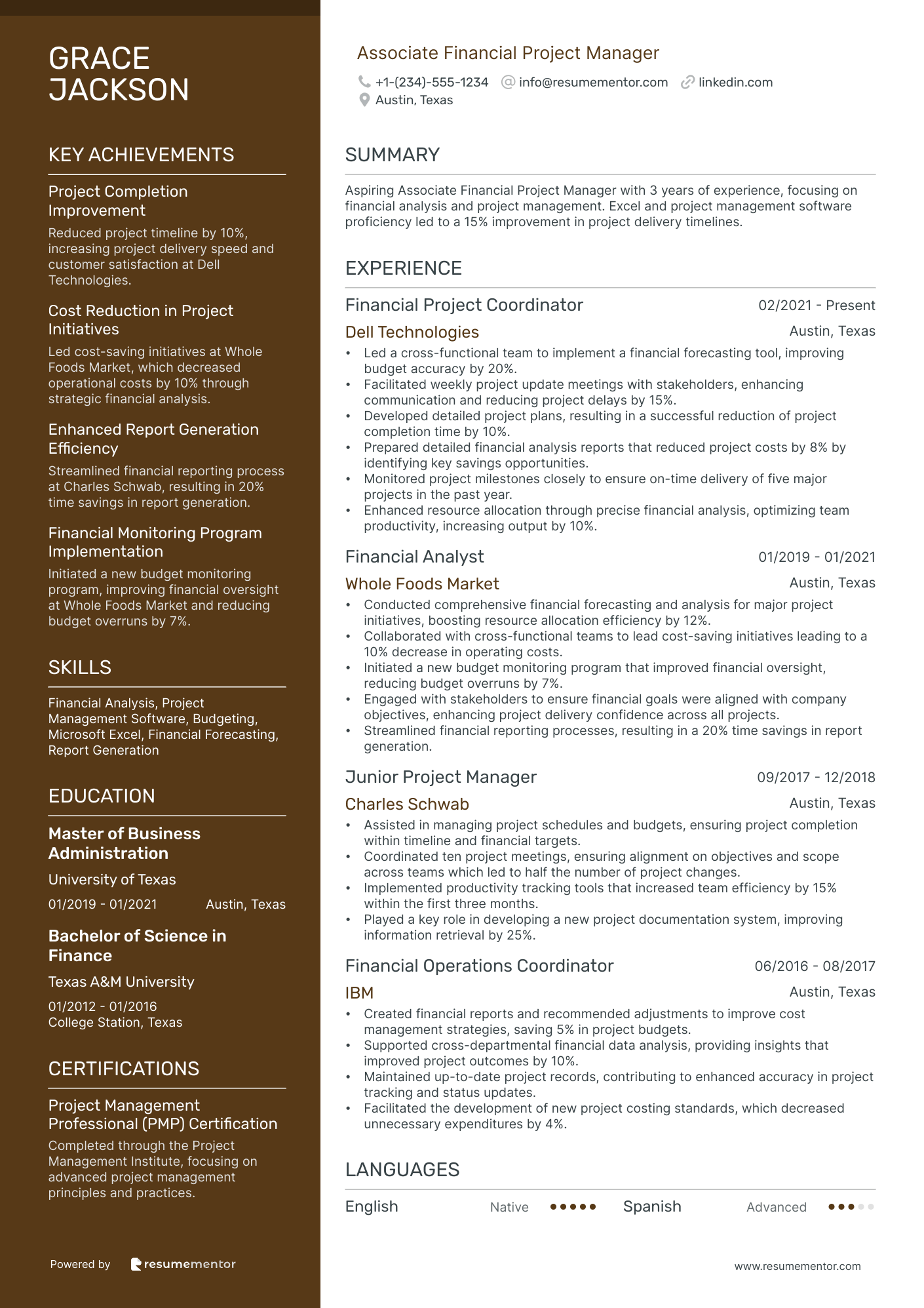
Associate Financial Project Manager
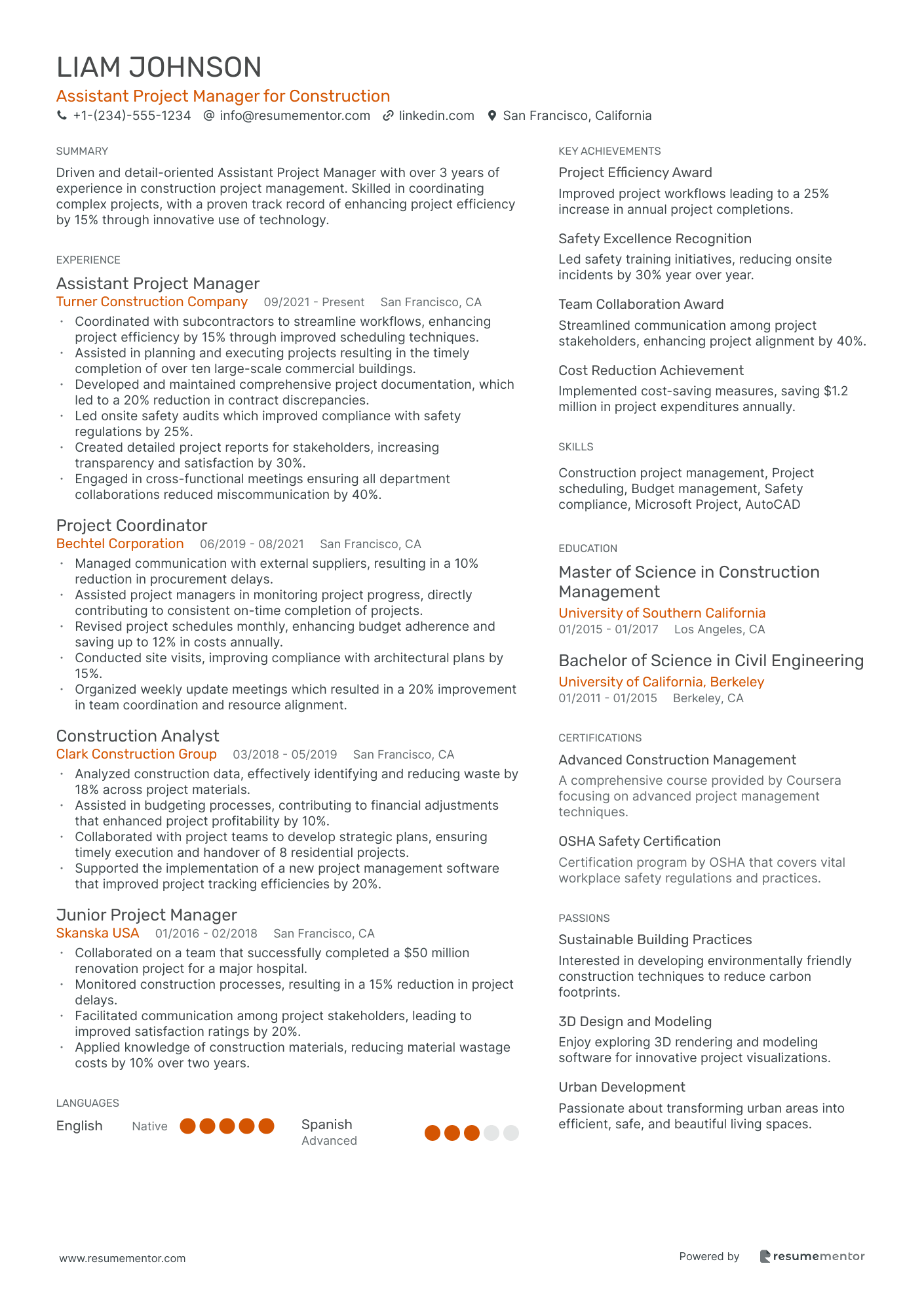
Assistant Project Manager for Construction
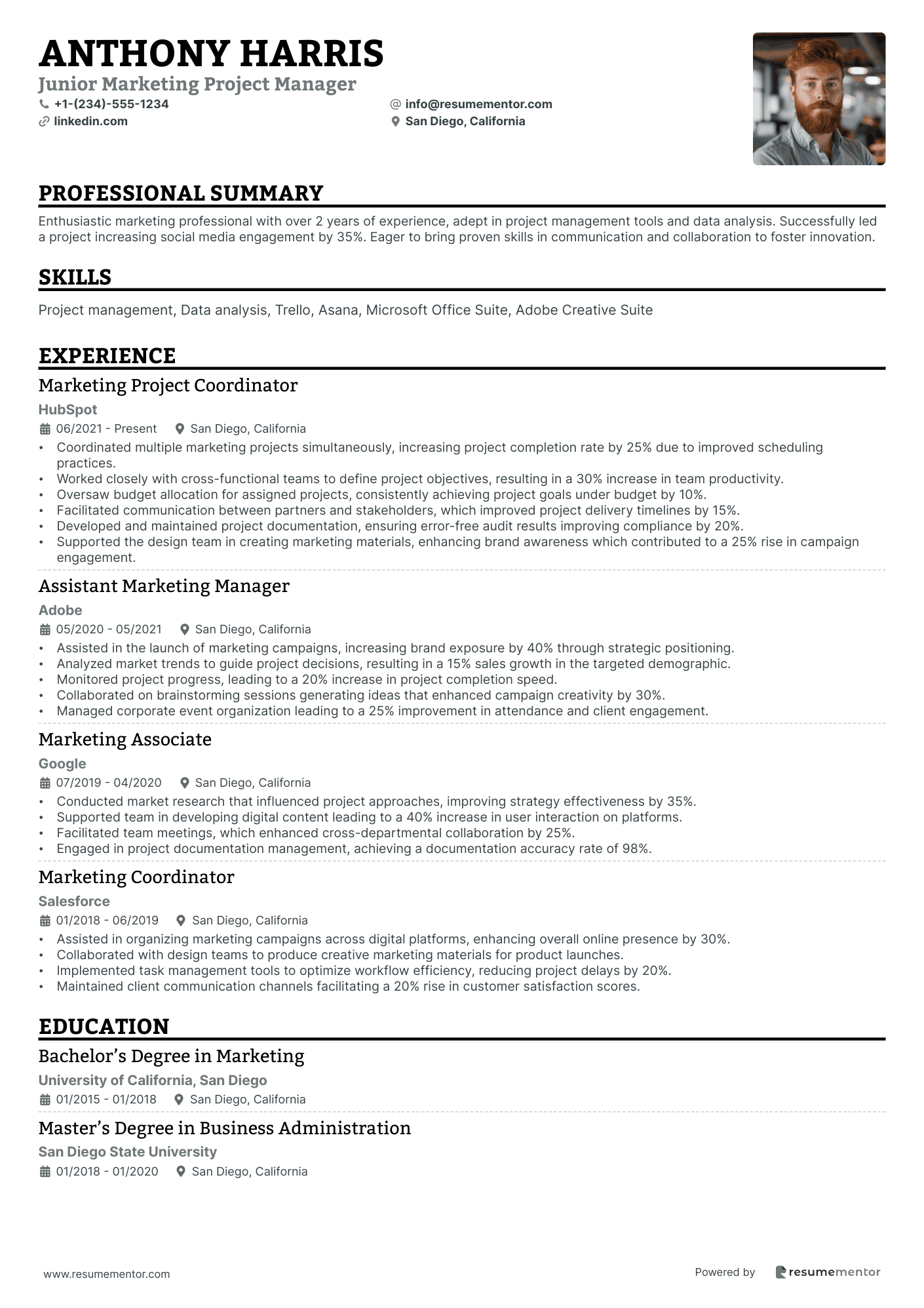
Junior Marketing Project Manager
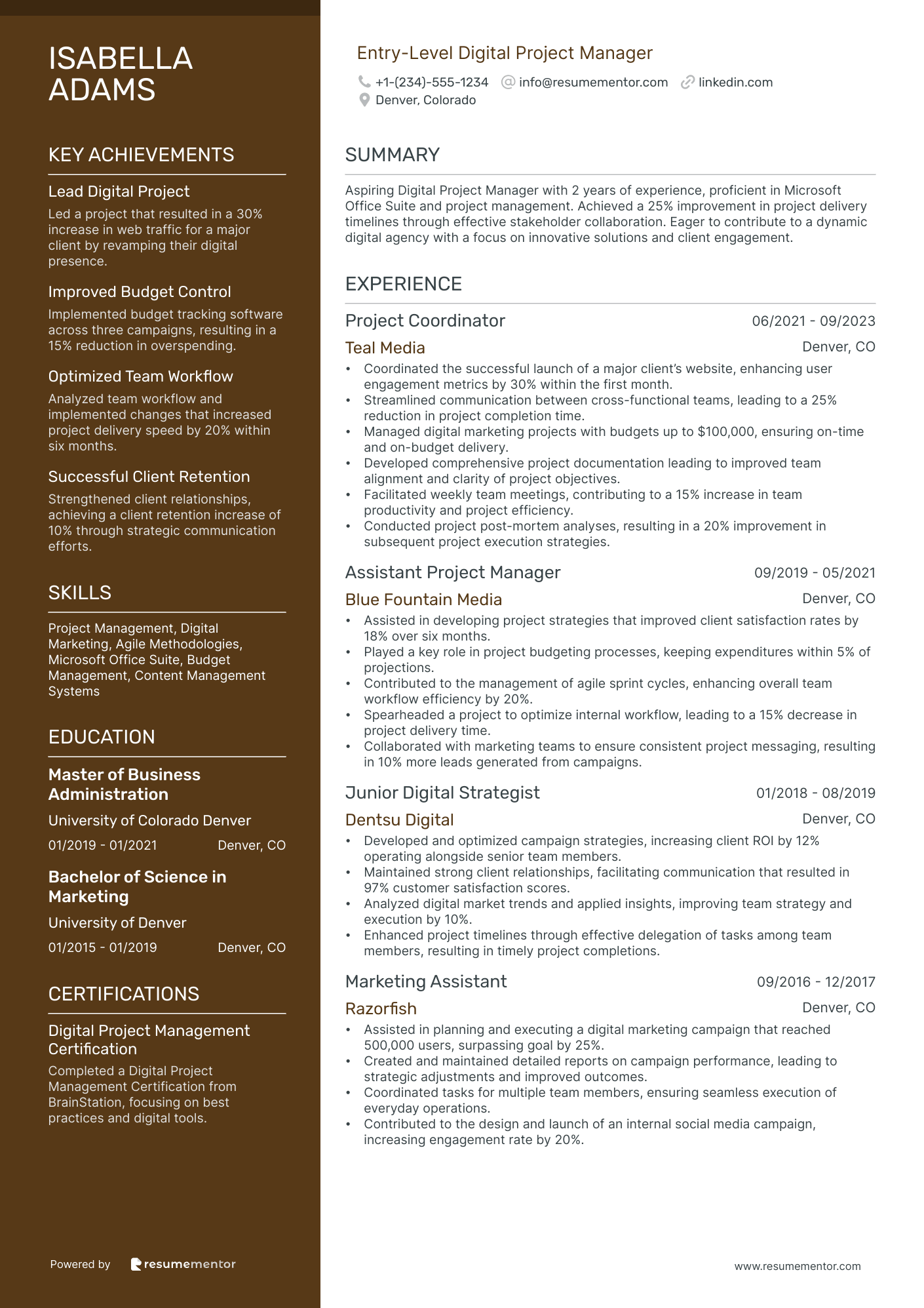
Entry-Level Digital Project Manager
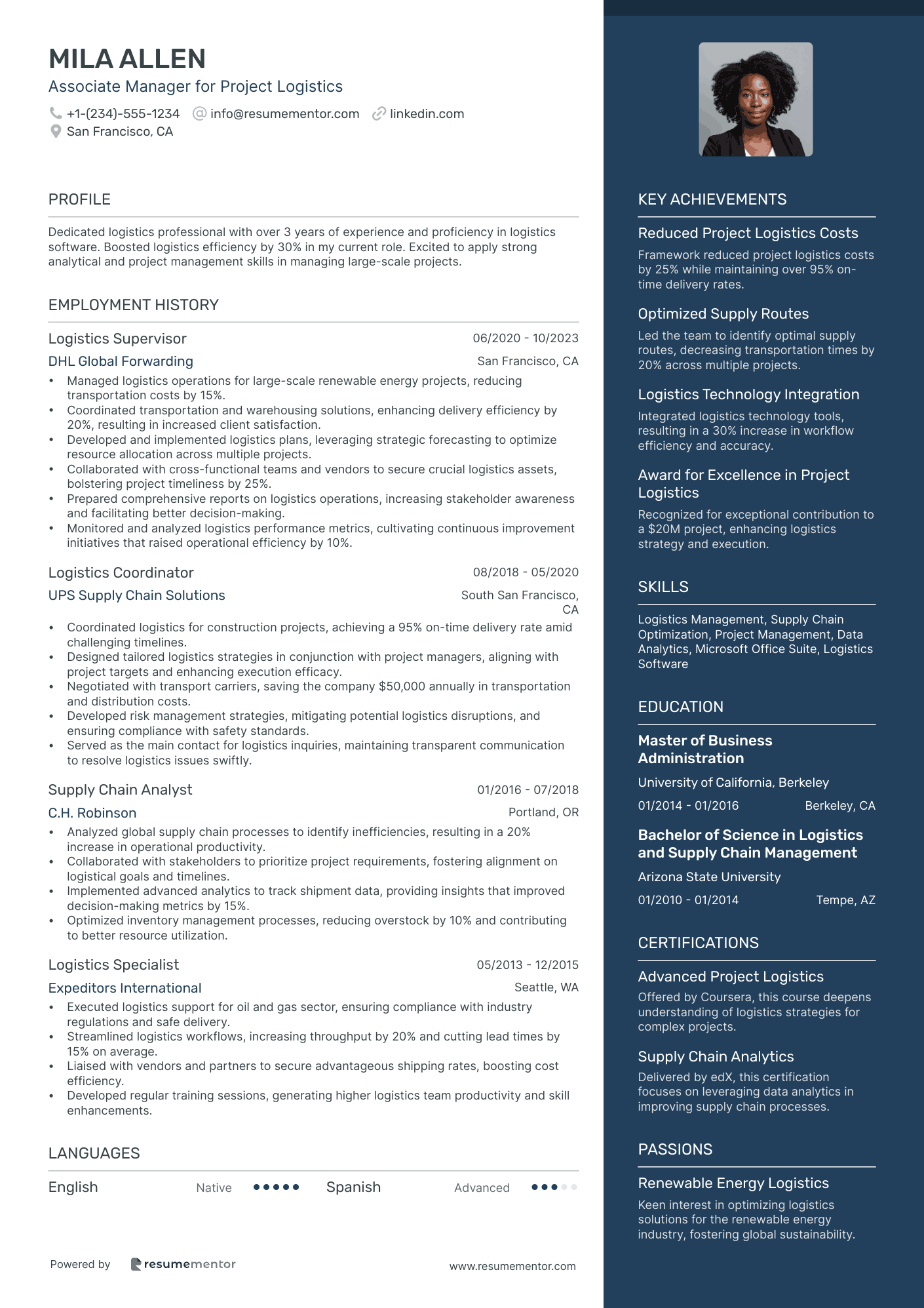
Associate Manager for Project Logistics
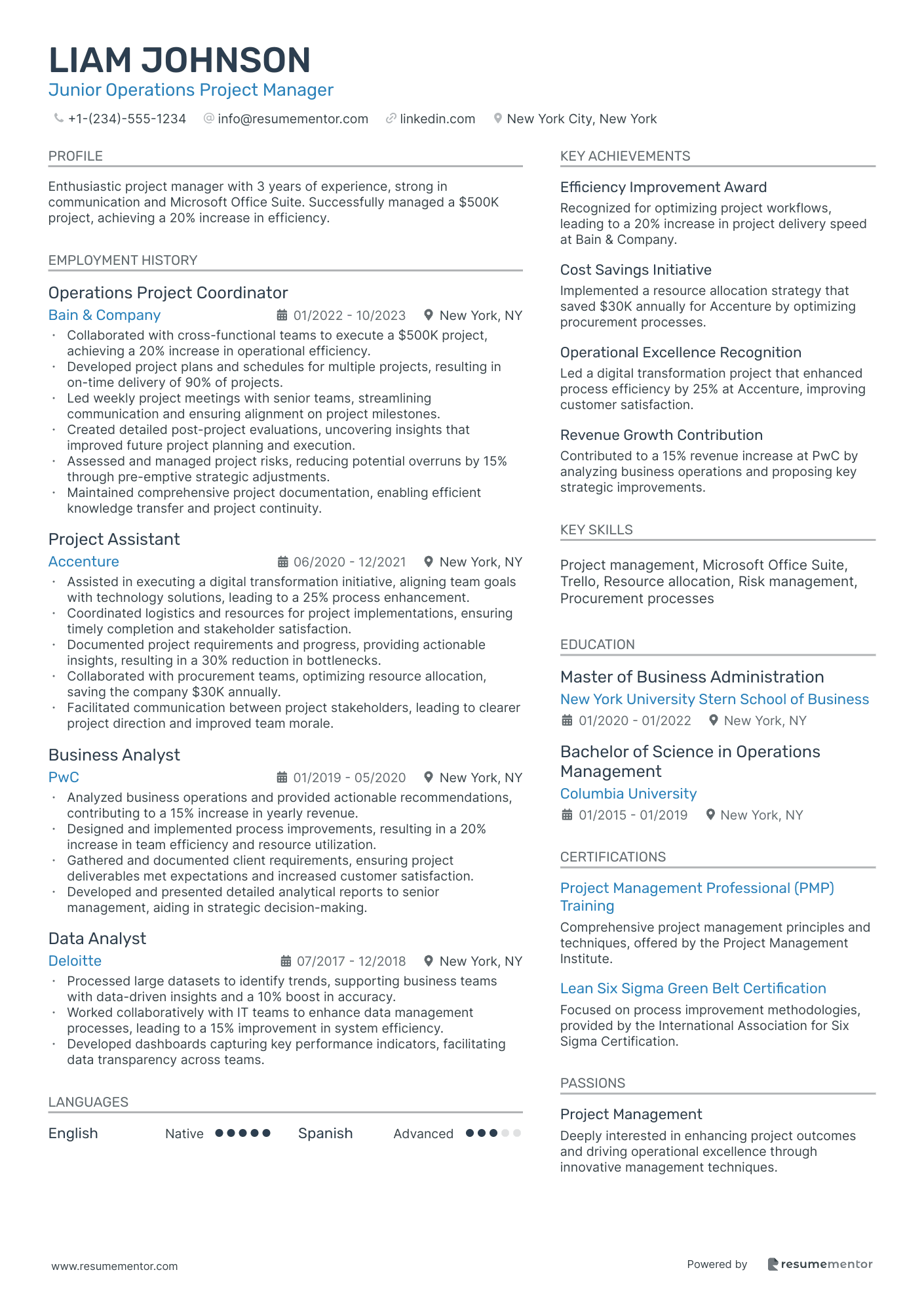
Junior Operations Project Manager
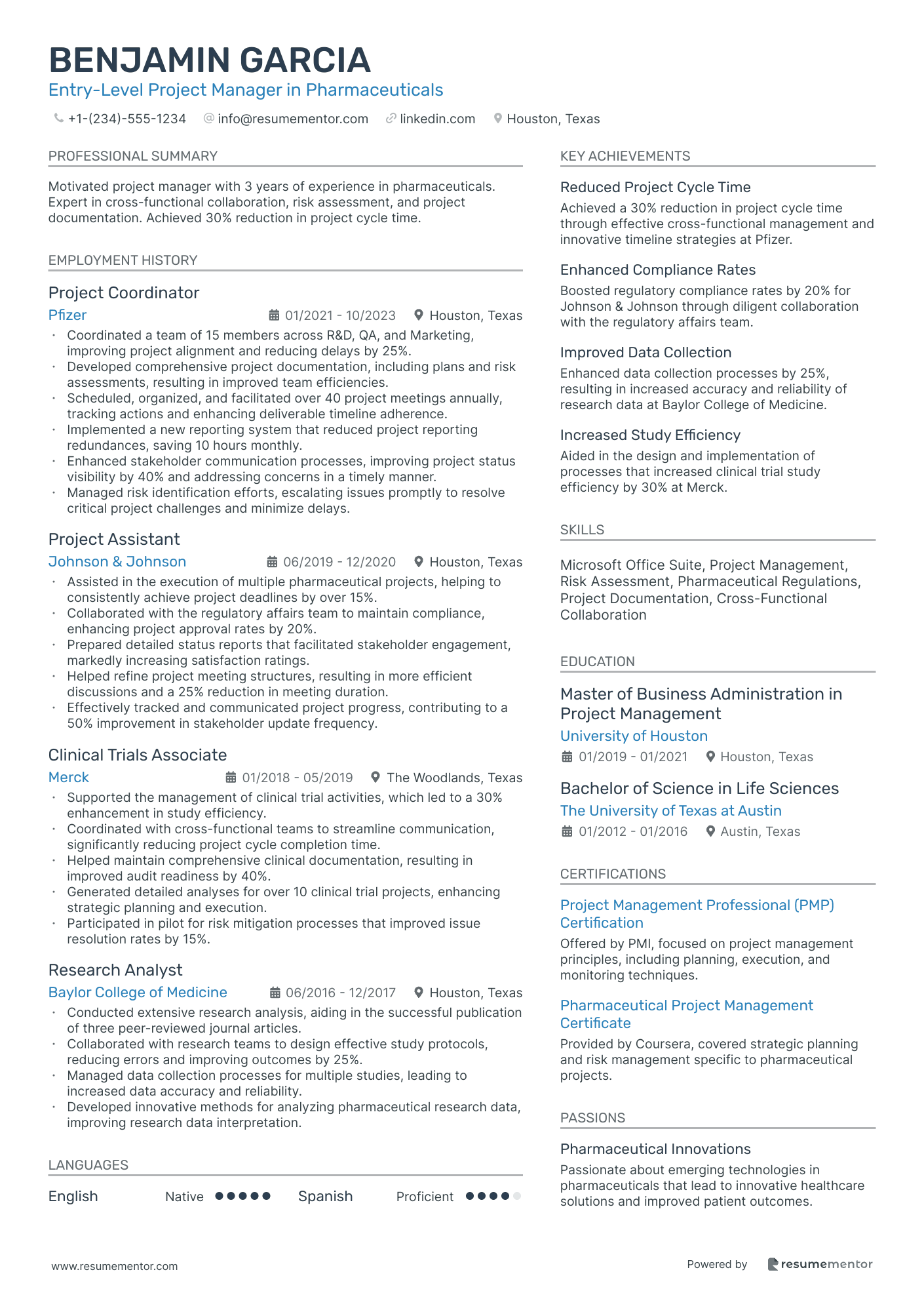
Entry-Level Project Manager in Pharmaceuticals
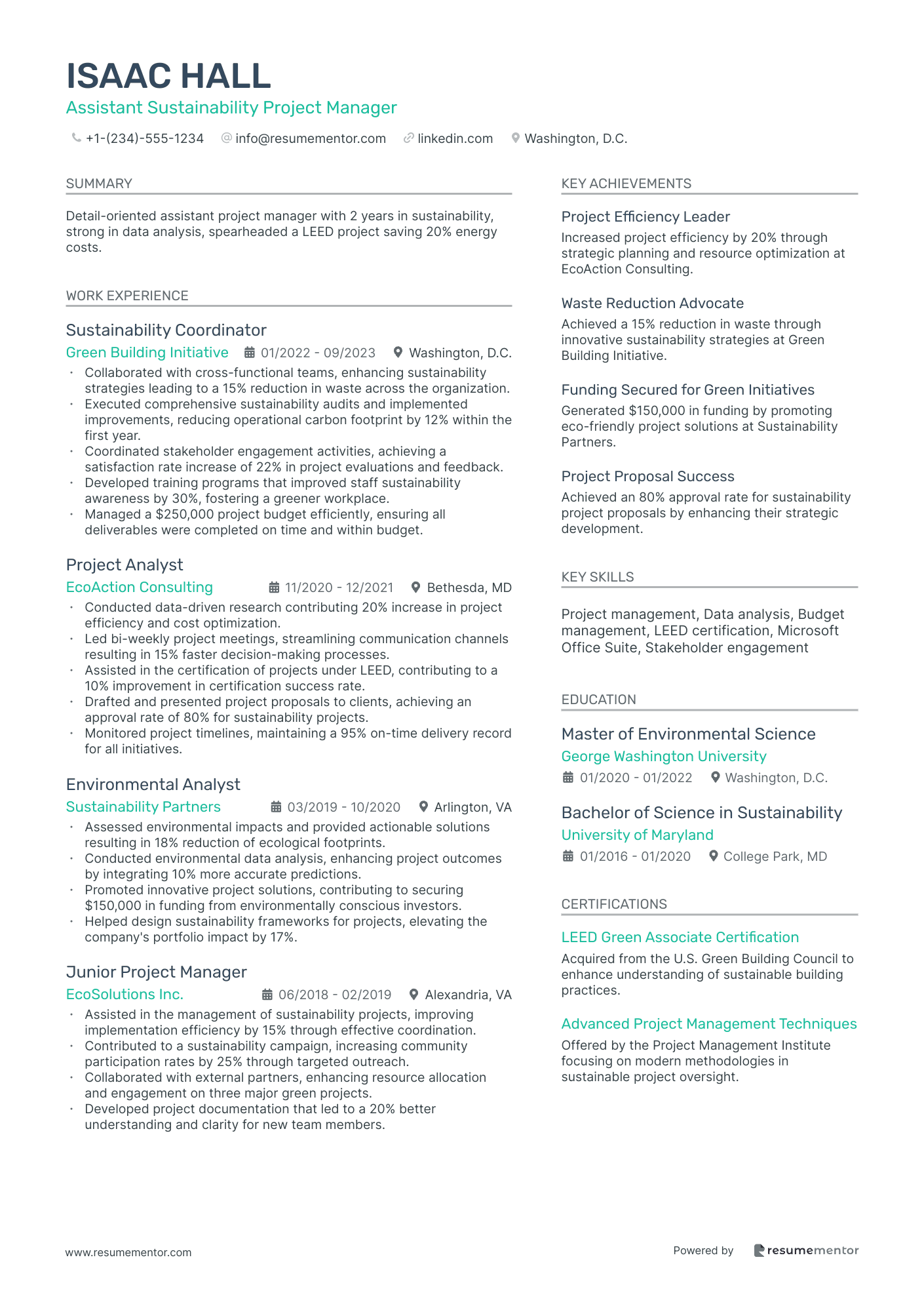
Assistant Sustainability Project Manager
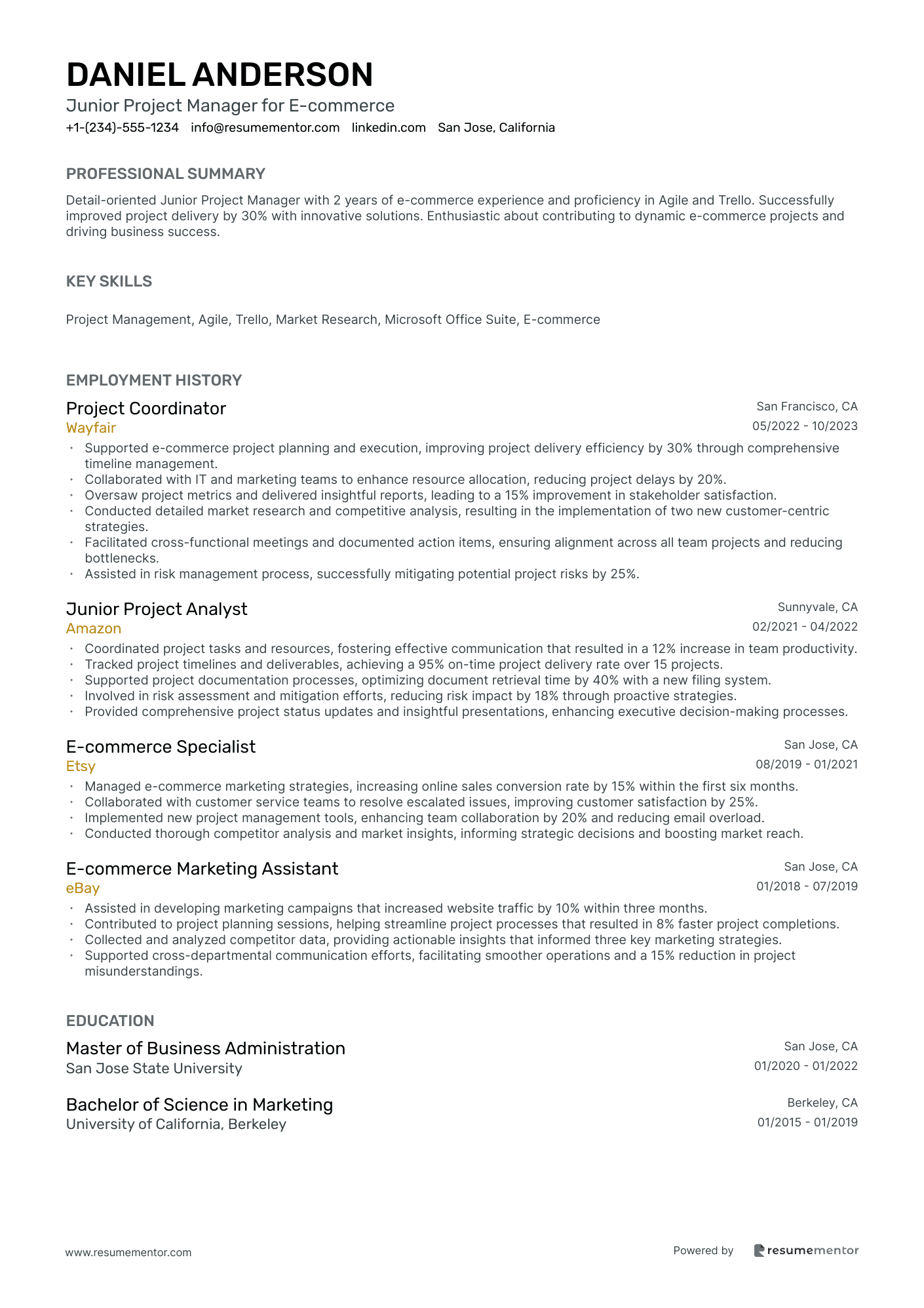
Junior Project Manager for E-commerce

Associate Financial Project Manager resume sample
- •Led a cross-functional team to implement a financial forecasting tool, improving budget accuracy by 20%.
- •Facilitated weekly project update meetings with stakeholders, enhancing communication and reducing project delays by 15%.
- •Developed detailed project plans, resulting in a successful reduction of project completion time by 10%.
- •Prepared detailed financial analysis reports that reduced project costs by 8% by identifying key savings opportunities.
- •Monitored project milestones closely to ensure on-time delivery of five major projects in the past year.
- •Enhanced resource allocation through precise financial analysis, optimizing team productivity, increasing output by 10%.
- •Conducted comprehensive financial forecasting and analysis for major project initiatives, boosting resource allocation efficiency by 12%.
- •Collaborated with cross-functional teams to lead cost-saving initiatives leading to a 10% decrease in operating costs.
- •Initiated a new budget monitoring program that improved financial oversight, reducing budget overruns by 7%.
- •Engaged with stakeholders to ensure financial goals were aligned with company objectives, enhancing project delivery confidence across all projects.
- •Streamlined financial reporting processes, resulting in a 20% time savings in report generation.
- •Assisted in managing project schedules and budgets, ensuring project completion within timeline and financial targets.
- •Coordinated ten project meetings, ensuring alignment on objectives and scope across teams which led to half the number of project changes.
- •Implemented productivity tracking tools that increased team efficiency by 15% within the first three months.
- •Played a key role in developing a new project documentation system, improving information retrieval by 25%.
- •Created financial reports and recommended adjustments to improve cost management strategies, saving 5% in project budgets.
- •Supported cross-departmental financial data analysis, providing insights that improved project outcomes by 10%.
- •Maintained up-to-date project records, contributing to enhanced accuracy in project tracking and status updates.
- •Facilitated the development of new project costing standards, which decreased unnecessary expenditures by 4%.
Assistant Project Manager for Construction resume sample
- •Coordinated with subcontractors to streamline workflows, enhancing project efficiency by 15% through improved scheduling techniques.
- •Assisted in planning and executing projects resulting in the timely completion of over ten large-scale commercial buildings.
- •Developed and maintained comprehensive project documentation, which led to a 20% reduction in contract discrepancies.
- •Led onsite safety audits which improved compliance with safety regulations by 25%.
- •Created detailed project reports for stakeholders, increasing transparency and satisfaction by 30%.
- •Engaged in cross-functional meetings ensuring all department collaborations reduced miscommunication by 40%.
- •Managed communication with external suppliers, resulting in a 10% reduction in procurement delays.
- •Assisted project managers in monitoring project progress, directly contributing to consistent on-time completion of projects.
- •Revised project schedules monthly, enhancing budget adherence and saving up to 12% in costs annually.
- •Conducted site visits, improving compliance with architectural plans by 15%.
- •Organized weekly update meetings which resulted in a 20% improvement in team coordination and resource alignment.
- •Analyzed construction data, effectively identifying and reducing waste by 18% across project materials.
- •Assisted in budgeting processes, contributing to financial adjustments that enhanced project profitability by 10%.
- •Collaborated with project teams to develop strategic plans, ensuring timely execution and handover of 8 residential projects.
- •Supported the implementation of a new project management software that improved project tracking efficiencies by 20%.
- •Collaborated on a team that successfully completed a $50 million renovation project for a major hospital.
- •Monitored construction processes, resulting in a 15% reduction in project delays.
- •Facilitated communication among project stakeholders, leading to improved satisfaction ratings by 20%.
- •Applied knowledge of construction materials, reducing material wastage costs by 10% over two years.
Junior Marketing Project Manager resume sample
- •Coordinated multiple marketing projects simultaneously, increasing project completion rate by 25% due to improved scheduling practices.
- •Worked closely with cross-functional teams to define project objectives, resulting in a 30% increase in team productivity.
- •Oversaw budget allocation for assigned projects, consistently achieving project goals under budget by 10%.
- •Facilitated communication between partners and stakeholders, which improved project delivery timelines by 15%.
- •Developed and maintained project documentation, ensuring error-free audit results improving compliance by 20%.
- •Supported the design team in creating marketing materials, enhancing brand awareness which contributed to a 25% rise in campaign engagement.
- •Assisted in the launch of marketing campaigns, increasing brand exposure by 40% through strategic positioning.
- •Analyzed market trends to guide project decisions, resulting in a 15% sales growth in the targeted demographic.
- •Monitored project progress, leading to a 20% increase in project completion speed.
- •Collaborated on brainstorming sessions generating ideas that enhanced campaign creativity by 30%.
- •Managed corporate event organization leading to a 25% improvement in attendance and client engagement.
- •Conducted market research that influenced project approaches, improving strategy effectiveness by 35%.
- •Supported team in developing digital content leading to a 40% increase in user interaction on platforms.
- •Facilitated team meetings, which enhanced cross-departmental collaboration by 25%.
- •Engaged in project documentation management, achieving a documentation accuracy rate of 98%.
- •Assisted in organizing marketing campaigns across digital platforms, enhancing overall online presence by 30%.
- •Collaborated with design teams to produce creative marketing materials for product launches.
- •Implemented task management tools to optimize workflow efficiency, reducing project delays by 20%.
- •Maintained client communication channels facilitating a 20% rise in customer satisfaction scores.
Entry-Level Digital Project Manager resume sample
- •Coordinated the successful launch of a major client’s website, enhancing user engagement metrics by 30% within the first month.
- •Streamlined communication between cross-functional teams, leading to a 25% reduction in project completion time.
- •Managed digital marketing projects with budgets up to $100,000, ensuring on-time and on-budget delivery.
- •Developed comprehensive project documentation leading to improved team alignment and clarity of project objectives.
- •Facilitated weekly team meetings, contributing to a 15% increase in team productivity and project efficiency.
- •Conducted project post-mortem analyses, resulting in a 20% improvement in subsequent project execution strategies.
- •Assisted in developing project strategies that improved client satisfaction rates by 18% over six months.
- •Played a key role in project budgeting processes, keeping expenditures within 5% of projections.
- •Contributed to the management of agile sprint cycles, enhancing overall team workflow efficiency by 20%.
- •Spearheaded a project to optimize internal workflow, leading to a 15% decrease in project delivery time.
- •Collaborated with marketing teams to ensure consistent project messaging, resulting in 10% more leads generated from campaigns.
- •Developed and optimized campaign strategies, increasing client ROI by 12% operating alongside senior team members.
- •Maintained strong client relationships, facilitating communication that resulted in 97% customer satisfaction scores.
- •Analyzed digital market trends and applied insights, improving team strategy and execution by 10%.
- •Enhanced project timelines through effective delegation of tasks among team members, resulting in timely project completions.
- •Assisted in planning and executing a digital marketing campaign that reached 500,000 users, surpassing goal by 25%.
- •Created and maintained detailed reports on campaign performance, leading to strategic adjustments and improved outcomes.
- •Coordinated tasks for multiple team members, ensuring seamless execution of everyday operations.
- •Contributed to the design and launch of an internal social media campaign, increasing engagement rate by 20%.
Associate Manager for Project Logistics resume sample
- •Managed logistics operations for large-scale renewable energy projects, reducing transportation costs by 15%.
- •Coordinated transportation and warehousing solutions, enhancing delivery efficiency by 20%, resulting in increased client satisfaction.
- •Developed and implemented logistics plans, leveraging strategic forecasting to optimize resource allocation across multiple projects.
- •Collaborated with cross-functional teams and vendors to secure crucial logistics assets, bolstering project timeliness by 25%.
- •Prepared comprehensive reports on logistics operations, increasing stakeholder awareness and facilitating better decision-making.
- •Monitored and analyzed logistics performance metrics, cultivating continuous improvement initiatives that raised operational efficiency by 10%.
- •Coordinated logistics for construction projects, achieving a 95% on-time delivery rate amid challenging timelines.
- •Designed tailored logistics strategies in conjunction with project managers, aligning with project targets and enhancing execution efficacy.
- •Negotiated with transport carriers, saving the company $50,000 annually in transportation and distribution costs.
- •Developed risk management strategies, mitigating potential logistics disruptions, and ensuring compliance with safety standards.
- •Served as the main contact for logistics inquiries, maintaining transparent communication to resolve logistics issues swiftly.
- •Analyzed global supply chain processes to identify inefficiencies, resulting in a 20% increase in operational productivity.
- •Collaborated with stakeholders to prioritize project requirements, fostering alignment on logistical goals and timelines.
- •Implemented advanced analytics to track shipment data, providing insights that improved decision-making metrics by 15%.
- •Optimized inventory management processes, reducing overstock by 10% and contributing to better resource utilization.
- •Executed logistics support for oil and gas sector, ensuring compliance with industry regulations and safe delivery.
- •Streamlined logistics workflows, increasing throughput by 20% and cutting lead times by 15% on average.
- •Liaised with vendors and partners to secure advantageous shipping rates, boosting cost efficiency.
- •Developed regular training sessions, generating higher logistics team productivity and skill enhancements.
Junior Operations Project Manager resume sample
- •Collaborated with cross-functional teams to execute a $500K project, achieving a 20% increase in operational efficiency.
- •Developed project plans and schedules for multiple projects, resulting in on-time delivery of 90% of projects.
- •Led weekly project meetings with senior teams, streamlining communication and ensuring alignment on project milestones.
- •Created detailed post-project evaluations, uncovering insights that improved future project planning and execution.
- •Assessed and managed project risks, reducing potential overruns by 15% through pre-emptive strategic adjustments.
- •Maintained comprehensive project documentation, enabling efficient knowledge transfer and project continuity.
- •Assisted in executing a digital transformation initiative, aligning team goals with technology solutions, leading to a 25% process enhancement.
- •Coordinated logistics and resources for project implementations, ensuring timely completion and stakeholder satisfaction.
- •Documented project requirements and progress, providing actionable insights, resulting in a 30% reduction in bottlenecks.
- •Collaborated with procurement teams, optimizing resource allocation, saving the company $30K annually.
- •Facilitated communication between project stakeholders, leading to clearer project direction and improved team morale.
- •Analyzed business operations and provided actionable recommendations, contributing to a 15% increase in yearly revenue.
- •Designed and implemented process improvements, resulting in a 20% increase in team efficiency and resource utilization.
- •Gathered and documented client requirements, ensuring project deliverables met expectations and increased customer satisfaction.
- •Developed and presented detailed analytical reports to senior management, aiding in strategic decision-making.
- •Processed large datasets to identify trends, supporting business teams with data-driven insights and a 10% boost in accuracy.
- •Worked collaboratively with IT teams to enhance data management processes, leading to a 15% improvement in system efficiency.
- •Developed dashboards capturing key performance indicators, facilitating data transparency across teams.
Entry-Level Project Manager in Pharmaceuticals resume sample
- •Coordinated a team of 15 members across R&D, QA, and Marketing, improving project alignment and reducing delays by 25%.
- •Developed comprehensive project documentation, including plans and risk assessments, resulting in improved team efficiencies.
- •Scheduled, organized, and facilitated over 40 project meetings annually, tracking actions and enhancing deliverable timeline adherence.
- •Implemented a new reporting system that reduced project reporting redundances, saving 10 hours monthly.
- •Enhanced stakeholder communication processes, improving project status visibility by 40% and addressing concerns in a timely manner.
- •Managed risk identification efforts, escalating issues promptly to resolve critical project challenges and minimize delays.
- •Assisted in the execution of multiple pharmaceutical projects, helping to consistently achieve project deadlines by over 15%.
- •Collaborated with the regulatory affairs team to maintain compliance, enhancing project approval rates by 20%.
- •Prepared detailed status reports that facilitated stakeholder engagement, markedly increasing satisfaction ratings.
- •Helped refine project meeting structures, resulting in more efficient discussions and a 25% reduction in meeting duration.
- •Effectively tracked and communicated project progress, contributing to a 50% improvement in stakeholder update frequency.
- •Supported the management of clinical trial activities, which led to a 30% enhancement in study efficiency.
- •Coordinated with cross-functional teams to streamline communication, significantly reducing project cycle completion time.
- •Helped maintain comprehensive clinical documentation, resulting in improved audit readiness by 40%.
- •Generated detailed analyses for over 10 clinical trial projects, enhancing strategic planning and execution.
- •Participated in pilot for risk mitigation processes that improved issue resolution rates by 15%.
- •Conducted extensive research analysis, aiding in the successful publication of three peer-reviewed journal articles.
- •Collaborated with research teams to design effective study protocols, reducing errors and improving outcomes by 25%.
- •Managed data collection processes for multiple studies, leading to increased data accuracy and reliability.
- •Developed innovative methods for analyzing pharmaceutical research data, improving research data interpretation.
Assistant Sustainability Project Manager resume sample
- •Collaborated with cross-functional teams, enhancing sustainability strategies leading to a 15% reduction in waste across the organization.
- •Executed comprehensive sustainability audits and implemented improvements, reducing operational carbon footprint by 12% within the first year.
- •Coordinated stakeholder engagement activities, achieving a satisfaction rate increase of 22% in project evaluations and feedback.
- •Developed training programs that improved staff sustainability awareness by 30%, fostering a greener workplace.
- •Managed a $250,000 project budget efficiently, ensuring all deliverables were completed on time and within budget.
- •Conducted data-driven research contributing 20% increase in project efficiency and cost optimization.
- •Led bi-weekly project meetings, streamlining communication channels resulting in 15% faster decision-making processes.
- •Assisted in the certification of projects under LEED, contributing to a 10% improvement in certification success rate.
- •Drafted and presented project proposals to clients, achieving an approval rate of 80% for sustainability projects.
- •Monitored project timelines, maintaining a 95% on-time delivery record for all initiatives.
- •Assessed environmental impacts and provided actionable solutions resulting in 18% reduction of ecological footprints.
- •Conducted environmental data analysis, enhancing project outcomes by integrating 10% more accurate predictions.
- •Promoted innovative project solutions, contributing to securing $150,000 in funding from environmentally conscious investors.
- •Helped design sustainability frameworks for projects, elevating the company's portfolio impact by 17%.
- •Assisted in the management of sustainability projects, improving implementation efficiency by 15% through effective coordination.
- •Contributed to a sustainability campaign, increasing community participation rates by 25% through targeted outreach.
- •Collaborated with external partners, enhancing resource allocation and engagement on three major green projects.
- •Developed project documentation that led to a 20% better understanding and clarity for new team members.
Junior Project Manager for E-commerce resume sample
- •Supported e-commerce project planning and execution, improving project delivery efficiency by 30% through comprehensive timeline management.
- •Collaborated with IT and marketing teams to enhance resource allocation, reducing project delays by 20%.
- •Oversaw project metrics and delivered insightful reports, leading to a 15% improvement in stakeholder satisfaction.
- •Conducted detailed market research and competitive analysis, resulting in the implementation of two new customer-centric strategies.
- •Facilitated cross-functional meetings and documented action items, ensuring alignment across all team projects and reducing bottlenecks.
- •Assisted in risk management process, successfully mitigating potential project risks by 25%.
- •Coordinated project tasks and resources, fostering effective communication that resulted in a 12% increase in team productivity.
- •Tracked project timelines and deliverables, achieving a 95% on-time project delivery rate over 15 projects.
- •Supported project documentation processes, optimizing document retrieval time by 40% with a new filing system.
- •Involved in risk assessment and mitigation efforts, reducing risk impact by 18% through proactive strategies.
- •Provided comprehensive project status updates and insightful presentations, enhancing executive decision-making processes.
- •Managed e-commerce marketing strategies, increasing online sales conversion rate by 15% within the first six months.
- •Collaborated with customer service teams to resolve escalated issues, improving customer satisfaction by 25%.
- •Implemented new project management tools, enhancing team collaboration by 20% and reducing email overload.
- •Conducted thorough competitor analysis and market insights, informing strategic decisions and boosting market reach.
- •Assisted in developing marketing campaigns that increased website traffic by 10% within three months.
- •Contributed to project planning sessions, helping streamline project processes that resulted in 8% faster project completions.
- •Collected and analyzed competitor data, providing actionable insights that informed three key marketing strategies.
- •Supported cross-departmental communication efforts, facilitating smoother operations and a 15% reduction in project misunderstandings.
As an entry-level project manager, crafting your resume can feel like navigating a complex project without a clear roadmap; this document is your first chance to make a strong impression in a competitive job market. To stand out, it's essential to highlight your organizational skills, problem-solving abilities, and any experience that underscores your potential. The challenge is doing this effectively, especially when your professional experience might be limited.
Blending your technical know-how with leadership qualities can set you apart, but getting the formatting and structure right can be tricky. A cluttered or incomplete resume won't do you any favors. That's why using a well-organized resume template is invaluable; it acts as your guiding compass, ensuring all crucial elements are presented clearly. By starting on the right foot with a professional resume template, you streamline your structure and cover all your bases.
Think of your resume as building a bridge between your skills and the job you desire. Each section should connect your strengths to the demands of the role, making your readiness clear. Highlighting relevant coursework, certifications, and transferable skills can demonstrate your capability to handle project management duties.
Remember, your resume is more than just a piece of paper—it's your gateway to a new opportunity. Perfecting it with the right tools and insights reflects your capabilities and ambitions, opening doors to your future.
Key Takeaways
- Crafting a well-organized teacher resume is crucial to making a strong impression in the competitive job market; it should effectively convey your organizational skills, leadership potential, and understanding of educational fundamentals.
- Utilizing a structured template ensures all crucial elements of the resume are presented clearly, and adjusting the format using modern options like Lato or Montserrat fonts contributes to a professional and approachable appearance.
- Highlighting relevant coursework, certifications, and transferable skills, such as problem-solving, time management, and communication, is essential to demonstrate your ability to manage educational tasks efficiently.
- Tailoring your experience section by quantifying achievements, utilizing action words, and aligning your resume with job advertisements can impactfully showcase your readiness for teaching roles.
- Incorporating additional sections like volunteer experience or language skills can provide a fuller picture of your capabilities, making you stand out to employers.
What to focus on when writing your entry-level project manager resume
An entry-level project manager resume should effectively convey your organizational skills, leadership potential, and a solid understanding of project management fundamentals. These elements assure recruiters of your ability to manage tasks efficiently while showcasing your eagerness to learn and grow.
How to structure your entry-level project manager resume
- Contact Information: Start with your full name, phone number, email address, and LinkedIn profile—ensuring recruiters can easily reach you. Providing current and accurate contact details adds a professional touch and facilitates seamless communication with potential employers. Make sure your email address is professional and your LinkedIn profile is up-to-date, as this can be an extension of your resume.
- Objective Statement: Use this section to express your passion for project management and align your career goals with the company’s vision. Incorporate terms like “project coordination” and “team leadership” to underline your interest in these areas—this helps establish a direct connection between your aspirations and the company's objectives. Crafting a specific and personalized objective can differentiate you from others and set the tone for the rest of your resume.
- Education: Highlight your degree along with any relevant coursework or projects that have prepared you for project management. Including certifications like CAPM can further demonstrate your commitment to the field—these academic and professional credentials help paint a picture of your foundational knowledge and dedication to growing in the industry. Make note of any honors or academic achievements that underscore your hard work and potential.
- Work Experience: Even if your experience is limited, focus on internships, part-time jobs, or volunteer work that involved planning, organizing, or managing tasks. This showcases your ability to apply project management principles in real-world settings—illustrating your proactive role, whether through quantifying achievements or highlighting significant contributions. Demonstrating your hands-on experience, even in small roles, can effectively convey your practical understanding of project management.
- Skills: Emphasize project management skills such as “time management,” “communication,” “risk assessment,” and “budget tracking” to reflect your preparedness for the role—skills are your toolkit for any project, and showcasing them lets recruiters know what tools you bring to the table. Highlighting technical and interpersonal skills relevant to project management indicates your readiness to tackle the dynamic aspects of project management tasks.
- Technical Proficiency: Familiarity with project management software like Microsoft Project, Trello, or Asana can demonstrate your readiness to use modern tools and systems—this knowledge is critical for efficient handling of project timelines, resources, and team communications in today's digital landscape. Outlining your competencies with these tools suggests adaptability to new environments and tech-savvy acumen.
To give a fuller picture of your abilities and interests, consider adding optional sections. "Volunteer Experience" or "Language Skills" can highlight your community involvement or your capacity to work with diverse teams. Up next, we'll cover each essential section more in-depth to shape your resume effectively.
Which resume format to choose
Crafting your entry-level project manager resume begins with selecting a format that highlights your strongest attributes for the industry. A functional format is particularly effective because it focuses on your skills and capabilities, which is ideal when you’re starting out and want to demonstrate your potential impact on projects.
Next, consider the font you use, as it contributes to the first impression. Modern options like Lato, Raleway, or Montserrat provide a professional and approachable appearance. These fonts ensure that your resume is easy to read, which is crucial when detailing your organizational and communication skills.
Saving your resume as a PDF is essential to maintain this polished look. PDFs ensure that your layout and formatting remain intact, regardless of how it is accessed by potential employers. This reliability is something you should aim to represent in your own project management skills.
As you arrange your content, use one-inch margins to create a smart, uncluttered presentation. This not only gives your resume a tidy look but also demonstrates your attention to detail—an essential trait for managing projects effectively. A well-structured resume makes it easier for employers to focus on your key skills and potential, increasing your chances of making a strong impression.
How to write a quantifiable resume experience section
The experience section of an entry-level project manager's resume is crucial for catching a hiring manager's eye because it highlights what you've done and showcases your ability to handle project management tasks effectively. You should structure this section clearly and concisely, starting with your latest role and working backward because listing only the positions where you gained relevant skills keeps the focus on your project management capabilities. Aim to include experiences from the past 5-10 years, or less if you're new to the workforce, ensuring it's current and relevant. Tailoring your resume to match the job ad is important because it aligns your skills and responsibilities with what the employer is seeking. Use action words like "led," "coordinated," or "implemented" to convey your impact clearly, ensuring each entry shows measurable accomplishments that prove your ability to meet goals and improve processes. This makes your experience section stand out by demonstrating real-world, valuable results. Format each entry with the company name, your position, location, and date range, followed by bullet points of your achievements, highlighting your contributions effectively.
Here's an example:
- •Successfully coordinated and completed 5 project implementations within budget and ahead of schedule, improving overall efficiency by 15%.
- •Facilitated clear communication among cross-functional teams, reducing project delays by 20%.
- •Implemented a project tracking system that increased task completion visibility by 30%.
- •Trained and guided a team of 10 interns, improving departmental project support by 25%.
This example shines because it features quantifiable achievements that clearly demonstrate your impact in an organization. Each bullet point ties into the skills and responsibilities expected from an entry-level project manager, providing concrete proof of your abilities. Focusing on clear, measurable outcomes ensures that potential employers can easily recognize the value you bring. The structured format makes your achievements easy to read and quickly highlights your strengths. Tailoring these points to the job you're applying for will further connect your experience to the employer's needs, making it a compelling addition to your resume.
Collaboration-Focused resume experience section
A collaboration-focused entry-level project manager resume experience section should seamlessly convey your ability to work within a team to reach common objectives. Begin by recalling instances where you actively engaged with colleagues, facilitated open communication, or ensured that everyone's ideas were considered. Your aim is to demonstrate how these collaborative efforts have directly contributed to successful project outcomes.
As you craft your example, incorporate specific details that highlight your role in enhancing teamwork. Explain how your involvement in projects led to successful results, showcasing clear examples of your impactful contributions. By aligning these examples with the job you're pursuing, you paint a vivid picture of how your communication and teamwork skills have advanced past projects and will continue to be an asset in future roles.
Intern
Tech Solutions Inc.
June 2022 - Present
- Worked with a team of five to brainstorm and develop a new product, enhancing initial designs through collective input.
- Led weekly brainstorming sessions that fostered an inclusive environment, ensuring all ideas were evaluated during project planning.
- Coordinated with other departments to sustain clear communication, improving workflow and facilitating successful project integration.
- Managed project timelines to ensure timely completion, while nurturing a positive and collaborative team atmosphere.
Innovation-Focused resume experience section
An innovation-focused project manager resume experience section should effectively showcase your leadership and organizational skills through relevant projects or work. Start by emphasizing your role in the projects, the impact you made, and the innovative methods you introduced. Using action verbs can keep your points dynamic and engaging, helping create a clear and concise picture of your contributions and skills through a few well-crafted bullets.
Smoothly transition to discussing how you managed challenges and collaborated with teams to drive innovative solutions. Highlight core skills vital for a project management role, even if your experiences aren't directly related. Demonstrate problem-solving abilities and leadership, and spotlight any tech solutions you leveraged or introduced. This cohesive approach displays your enthusiasm and readiness for an innovation-focused project management position.
Volunteer Lead
Springfield Community Initiative
June 2021 - August 2022
- Organized a team of 10 volunteers to create a community garden, leading to a 50% increase in local engagement.
- Implemented a task management app that boosted team communication and project efficiency by 40%.
- Coordinated with local businesses to secure sponsorships, raising funds and resources worth $5,000.
- Introduced new digital tools that streamlined project documentation and reporting.
Problem-Solving Focused resume experience section
A problem-solving-focused project manager resume experience section should showcase your ability to tackle challenges and deliver effective solutions. Start by highlighting roles or projects where you played a crucial role in overcoming obstacles. Clearly describe the issues you faced, the actions you took to resolve them, and the positive impact of your efforts. Use clear language and quantifiable results to highlight the value you brought to the team, making it easy for potential employers to appreciate your contributions.
Organize your experience section with the latest roles first, and include details like dates of employment, job titles, and company names. For each role, list key problem-solving achievements using bullet points. Focus on outcomes that demonstrate growth and learning, linking them to your ability to handle challenges effectively. This approach not only highlights your problem-solving abilities but also shows potential employers your readiness to contribute meaningfully to their projects.
Project Management Intern
Tech Innovators Inc.
June 2021 - Present
- Led a team of five to find and fix project timeline delays, cutting delivery time by 15%.
- Created a step-by-step troubleshooting guide that boosted new team members' task efficiency by 25%.
- Started bi-weekly problem-solving workshops, increasing team brainstorming sessions by 40%.
- Solved communication issues by setting up a feedback loop, leading to a 30% rise in project clarity.
Skills-Focused resume experience section
A skills-focused entry-level project manager resume experience section should concentrate on demonstrating your abilities, particularly if you're entering the field for the first time. Begin by identifying essential project management skills like organization, communication, leadership, and problem-solving. Reflect on instances from past experiences, such as internships or volunteer work, where you've utilized these skills. This approach helps convey how your background prepares you for managing projects.
Structuring your experience section to highlight achievements related to these skills is crucial. Use clear and concise bullet points to detail specific actions and outcomes. This strategy allows hiring managers to recognize your potential even if you haven't held a project management job before. Incorporating action verbs and quantifying results where possible can also enhance the impact of your resume statements.
Volunteer Coordinator
June 2021 - August 2023
- Organized community events, leading a team of 10 volunteers to ensure smooth execution.
- Developed a tracking system that improved volunteer attendance and engagement by 30%.
- Facilitated weekly team meetings to set goals and address issues, enhancing team communication.
- Worked with stakeholders to manage resources efficiently and adhere to budget constraints.
Write your entry-level project manager resume summary section
A well-crafted entry-level project manager resume summary should quickly highlight your most relevant skills and experiences. Start with a sentence that emphasizes your strengths in a simple, impactful way. This section is your chance to grab attention and convey who you are as a candidate.
The summary above is effective because it links key skills and actual experiences directly relevant to project management. Your role in leading teams and handling deadlines paints a picture of someone who can manage critical tasks effectively. When the language used hints at enthusiasm and challenge-readiness, it brings your capabilities to life.
Smoothly connecting your descriptions involves using your achievements as a bridge to your skills and traits. Words that showcase your actions and their impact can make your narrative both short and engaging. This approach helps illuminate your strengths clearly and confidently.
Choosing between a resume summary and other sections, like an objective or profile, depends on your goals and experience. A summary focuses on your skills and previous achievements, while an objective clarifies your career aims. Meanwhile, a profile highlights personal traits, and a summary of qualifications lists key successes. Each choice offers a distinct slice of your professional journey, helping you tell your story convincingly.
Listing your entry-level project manager skills on your resume
A skills-focused entry-level project manager resume should effectively highlight what makes you a strong candidate. You can showcase your skills in a separate section or integrate them into your experience or summary. Including your strengths and soft skills helps potential employers get a sense of your personality and your ability to work well with others. On the other hand, hard skills are technical abilities like using project management software and managing workflow processes.
These skills and strengths aren't just listed for show; they also act as crucial keywords in your resume. Employers seek these keywords during initial scans to identify the best candidates, making your resume stand out both to hiring managers and automated tracking systems.
Here's an example of how to structure a standalone skills section for an entry-level project manager:
This skills section is effective because it includes a balanced mix of hard and soft skills that are essential for project management. It covers a range of competencies that employers are looking for, each related to crucial duties in a project management role.
Best hard skills to feature on your entry-level project manager resume
Showcasing your hard skills demonstrates your technical knowledge and understanding of project management fundamentals. These skills convey your ability to apply what you know in practical situations.
Hard Skills
- Agile Methodologies
- Scrum Techniques
- Budget Management
- Task Scheduling
- Resource Allocation
- Quality Assurance
- Risk Management
- Microsoft Office Suite
- Project Scheduling Software
- Stakeholder Analysis
- Data Analysis
- Contract Negotiation
- Cost Estimation
- Process Improvement
- Gantt Chart Management
Best soft skills to feature on your entry-level project manager resume
Emphasizing your soft skills showcases your interpersonal abilities and knack for leadership and teamwork. These skills highlight how effectively you can communicate and work with others.
Soft Skills
- Communication
- Team Leadership
- Problem Solving
- Time Management
- Adaptability
- Conflict Resolution
- Attention to Detail
- Decision Making
- Creative Thinking
- Empathy
- Networking
- Initiative
- Delegation
- Motivational Skills
- Stress Management
How to include your education on your resume
The education section is a key part of your entry-level project manager resume. It lays the foundation for your qualifications and sets you apart from other candidates. Tailor this section to the job by highlighting relevant studies and leaving out unrelated education. List your degree clearly, stating if you received honors like cum laude. If your GPA is strong, consider including it following the format: "GPA: 3.8/4.0." It should be listed immediately after your degree and school name.
Here’s how not to do it:
Now, here’s how to do it right:
This second example is effective because it underlines an educational background that is relevant to project management. The degree in Business Administration connects closely with project management principles. Mentioning honors like cum laude enhances your credibility, and the GPA shows academic excellence. Tailored education details can make a significant impact, showing potential employers you have the skills and knowledge needed for the job.
How to include entry-level project manager certificates on your resume
Including a certificates section in your entry-level project manager resume is crucial. Certificates show your dedication to learning and expanding your expertise. It’s important to list the name of the certificate clearly. Include the date you received it and add the issuing organization’s name. Certificates can be featured prominently in the header for quick visibility.
For instance, in your resume header, you could write: "Certified Associate in Project Management (CAPM), PMI, 2022." This approach makes key certifications easy to spot right away.
A standalone certificates section should be detailed and relevant. Here’s an example:
This example is good because it includes essential project management certificates. It also shows the issuing organizations, adding credibility. The titles are clear and specific, and the layout is organized. Having this detailed section helps demonstrate your qualifications and readiness for an entry-level project management role.
Extra sections to include in your entry-level project manager resume
Creating a successful entry-level project manager resume involves more than just listing your job experiences. To stand out from the crowd, consider including sections that highlight your unique skills and interests. These additional sections can help showcase a well-rounded personality and diverse skill set that prospective employers value.
- Language section — Show off your language skills to highlight your ability to communicate across cultures and enhance your team collaboration.
- Hobbies and interests section — List your hobbies and interests to offer a glimpse into your personality and teamwork skills, making you more relatable.
- Volunteer work section — Emphasize your volunteer work to demonstrate your commitment to community and ability to manage projects outside a work setting.
- Books section — Mention influential books you’ve read to reflect your continuous learning and growth mindset, which is crucial for project management.
Including these sections can add depth to your resume and make you more appealing to hiring managers. Craft each section thoughtfully to maximize the impact.
In Conclusion
In conclusion, crafting a resume as an entry-level project manager requires precision and clarity. Begin with a strong focus on essential project management skills and utilize a clear, concise format to effectively present your capacities to future employers. Remember the importance of tailoring your resume to showcase the skills and experiences that directly align with the job you are applying for. Be sure to highlight any certificates or additional training that underscore your dedication to the field. Integrating sections that reflect personal interests or volunteer work can present a well-rounded image and align your personal values with professional goals. Prioritize readability by selecting modern fonts and ensuring your resume remains neat and structured. Utilize measurable achievements to substantiate your capabilities and make use of action words to convey the dynamism of your impact. By organizing your education, experiences, and skills sections effectively, you communicate your readiness to join and significantly contribute to a project management team. Each element of your resume should serve as a bridge, connecting your past experiences to the potential you can bring to a future role. This strategic approach, grounded in clarity, specificity, and professionalism, will enhance your visibility in the competitive job market and provide a compelling case for your candidacy as a project manager.
Related Articles

Continue Reading
Check more recommended readings to get the job of your dreams.
Resume
Resources
Tools
© 2026. All rights reserved.
Made with love by people who care.

